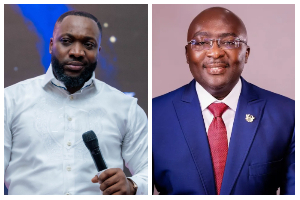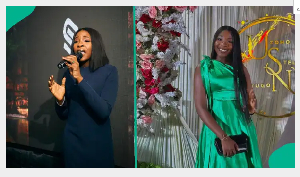“Unless you take all Ghanaians to be fools, but Ghanaians are not fools, so the type of questions I’m asking, every Ghanaian will ask those questions and will be able to draw a conclusion that this is desperation at its highest peak….
“…If I have GHS10 to pay or to bribe anybody to speak for me, it is not Bugri Naabu that I’ll be wasting that money on. NPP itself knows. And this issue where he cannot even speak for himself shows that he cannot even be speaking for anybody. A person, who cannot even speak for himself, cannot be able to speak for another person.
“I am saying that this whole story is something that is not worthy of the airtime you are spending on it…” (Asiedu Nketia).
BUGRI NAABU’S SCRUMPTIOUS TRUTH IS UNLIKE THE REALITY OF DEATH
“Never forget that intelligence rules the world and ignorance carries the burden. Therefore, remove yourself as far as possible from ignorance and seek as far as possible to be intelligent” (Marcus Garvey).
And, of course, the scandalous bribery allegations which Bugri Naabu brought against the Mahama family and the NDC in the lead-up to the general elections, are still fresh in our minds.
It is one of those opprobrious narratives on corruption we will never forget, not least in our lifetime. As a matter of fact they have also become a normative fixture of institutional memory.
This is probably why they are never going to go away any time soon, for truth does not always look a pregnancy bulge which some say can never be hidden forever.
Live birth, phantom pregnancy (“pseudocyesis”), cryptic pregnancy, fibroids, and miscarriage may distort this perception of a pregnancy bulge.
At this stage of scientific and technological revolution, not even a man in the throes of the so-called couvade syndrome can genuinely develop a pregnancy bulge.
We are speaking in a figurative language of course—however.
From our angle however, truth looks more like the enlightened endarkenment of death, a verdict no human being can avoid.
Of course, the phrase “enlightened endarkenment” may look sort of an Orwellian doublespeak but that, unfortunately, is what the categorical verdict of death actually is.
The ontology of death, like that of truth, can be both enlightening and endarkening depending on whether it brings about further understanding of the mystery of nature, or otherwise in that it rather further complicates, obfuscates or closes the chapter on any meaningful quest for uncoffining the tortuous mystery of nature.
Again, death is not an absolute synonym of obituary, of coffin. So is the ontological eloquence of truth.
What is more, death like truth is absolute and thus the scarred hands of relativity do not share in this controversial framology of conceptual contests, for, among other things, truth is difficult to bury for good in the graveyard of phenomenology on account of its being likened to the characteristic imperviable buoyancy of a cork.
What is more, there is no doubt in our minds that popular ignorance and unintelligence complicate these pressing questions even further because, once again, truth, as the gold standard of a patriotic national ethos—is no longer what it once used to be as Ghanaians can no longer demonstrably stand its acidic juice.
The truth—more like the acidic juice of Kaffir lime can also induce sensational jowl- and jaw-wracking currents in the collective conscience of a people who are not comfortable with it.
The funny thing is that Ghanaians, like other human beings, detest the amicable countenance of inconvenient truths with passion but are quick to idolize, to celebrate, and to embrace without question pampered lies with the sheepish pride of angelic innocence.
Thus pervasive corruption is the new language of truth, of political morality in an Orwellian society such as Ghana.
FOOD FOR THOUGHT
“I will kill all the rats, cockroaches and mosquitoes” (Tunji Braithwaite; a quote referring to Nigerian political criminals).
The Ghanaian political landscape is a sickly zoo, an insane asylum of reprobate, pathological and murderous political criminals and scoundrels simultaneously masquerading as inveterate angels and apostles of moral purity, men and women who claim to be against public decay and corruption—but are the exact opposite of what they actually claim to be, enemies of the masses.
These Machiavellian and dubious moral crusaders are cyclically voted into political office by an unsophisticated electorate only for them to end up impoverishing the country and plundering the national purse.
They have always flown into office on an ornithopter of political and moral corruption. These unabashed political free riders have been the bane of the country’s development. And they are, ironically, both found in the New Patriotic Party (NPP) and the National Democratic Congress (NDC).
In these criminal political organizations there are no model angels and saints, only incorrigible cannibalistic ogres and immoral Luddites.
But who can blame them when the entire nation itself is awash in a sea pool of criminality and corruption?
Are the NDC and the NPP not a microcosm, a comparable sightful exactitude of this sickly nation?
Is it any one’s place to suggest that good men and women of conscience must stay away from these criminal organizations? We cannot deny the fact that the professional incompetence of the NPP strongly mirrors the unprofessional incompetence of the NDC. The beautiful soul of this once-promising nation-state is slowly dying in the lap of official ineptitude, dereliction and corruption.
Ghana finds itself in a stinking zone of arrested development partly as a result of the poisonous polarizing from these awful organizations, more so because the dearth of high quality leadership in the present generation of political expression should give cause for concern as the introduction of post-factual politics into Ghana’s kleptomaniacal duopoly crowds out commonsense politics.
This is largely because once in office, these counterfeit moral crusaders do not shy away from visiting their immoral kamikaze attacks of economic and social euthanasia on the masses who voted them into power, a deeply worrying trend in matters of political relations.
What have the masses in store for the Ghanaian version of what Braithwaite had provocatively referred to as “the rats, cockroaches and mosquitoes”?
Finally those of our social, political and moral activists who are urging the Ghanaian Middle Class to rise up against the wanton corruption of the ruling elites and other agents of institutional corruption have to be extremely cautious about their choice of language.
After all, it was the ordinary Ghanaian whose exercise of the franchise chose Akufo-Addo over President Mahama, and not a phantom Middle Class Ghanaian, a bogus socio-economic class.
Those who go by this conveniently selective approach could end up inadvertently endorsing the indiscriminate marginalizing of entire communities of deeply conscientized Ghanaians who may be opposed to institutional corruption. It is panethnic sodality and panclass alliance we need in the face of wanton corruption.
Effectively fighting institutional corruption, then, will require more than the moral will of the people, political commitment from the ruling class, executive and judicial and parliamentary exercise of coercive power and diplomacy, education and public awareness about the dangers of public corruption, whistleblowing and passage of the Right to Information Bill (ROIB), enforcing existing laws, and improved standards of living and quality of life for the vast majority of hardworking Ghanaians.
Rather, to think of effectively fighting institutional corruption will entail social and moral revolution in the cognitive psychology of the ordinary Ghanaian.
Is Bugri Naabu really crying out for justice? Such a despicable bunch of scheming nation wreckers!
THE FATE OF BUGRI NAABU’S SCANDALOUS ALLEGATIONS AGAINST THE MAHAMA FAMILY
This brings us to the last major point before we bring down the curtain on this chapter, which is about the large quantum of money involved in the bribery scandal.
Of course the money allegedly originated from the Mahama family, and whether it actually originated from Ibrahim Mahama’s disposable or discretionary purse is irrelevant, but what is rather relevant is the sheer number of well-furnished schools that could have been built to replace under-tree classrooms across the country.
The Mahama family has the right to do whatever it wants to do with its vast wealth but certainly not the way Bugri Naabu has alleged. Somebody has serious explaining to do in this controversial matter.
That is to say, the two camps need to clear themselves over this scandalous question of alleged malfeasance and bribery. Ghanaians and the world reserve the right to know who is lying and who is telling the truth in this matter. This is not just any case to sweep under the carpet, so to speak.
The credibility of the Mahama family and that of Bugri Naabu is on the line. It is high time they let out the truth.
We shall return with Part 2.
REFERENCES
“Only Fools Will Believe NPP’s Bribery Story—Asiedu Nketia.” November 30, 2016.
Opinions of Saturday, 24 December 2016
Columnist: Kwarteng, Francis














